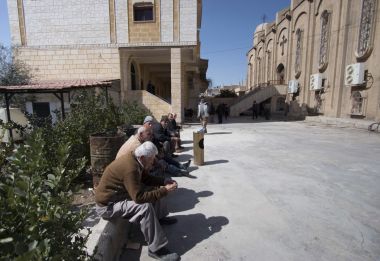ISIS 'demand $30m ransom for Assyrian hostages'

More than 250 Assyrian hostages held by Islamic State could be released in return for up to $30 million dollars.
The hostages were taken by ISIS militants during raids in a number of villages near Tel Hmar, south of the Khabour river in Syria, on 23 February. It is not known how many were taken, but estimates range between 250 to 300. A representative from A Demand For Action (ADFA), a group campaigning for the protection of religious minorities, told Christian Today that ISIS is now demanding $100,000 per individual for their release.
An official from the Assyrian Church of the East, Younan Talia, who is invovled in the negotiations confirmed the figure during an interview on an Assyrian radio station in Australia. The negotiations have been ongoing for weeks alongside third-party Syrian Sunni Muslims from the region who are mediating.
Spokesperson for ADFA, Diana Yacqo, told Christian Today that they are worried ISIS will continue to demand even more money, "not just for our hostages but this could open new doors for them. It's over a month now, and they are still captives," she said.
"The international out cry from international leaders has been silent. It lasted about a week, and that is concering. Their [the hostages'] safety is the first priorty and responsible authorties should be working around the clock to make the situation a safe one."
"They [ISIS] know we cannot come up with this kind of money, so they are hoping other groups and countries will come up with the money," an Assyrian official warned Fox News.
ISIS previously released 23 Assyrian hostages from Tel Goran and Tel Shamiran villages. The circumstances under which they were set free are unknown, but British-based Syrian Observatory for Human Rights (SOHR) said the captives were processed through a Sharia court. Most are believed to have been at least 50 years old, though there was at least one six-year-old girl among the freed.
Head of the Assyrian Human Rights Network, Osama Edward, told Vatican Radio at the time that a tax levied on non-Muslims, known as jizya, had been paid.
Since the attack in February, ISIS has besieged several ancient Assyrian sites, including the Iraqi city of Nimrud, the village of Khorsabad, and Hatra, a 2,000-year-old city. On Easter Sunday, militants destroyed the Virgin Mary Church in Tel Nasri, Khabur. According to reports, the church was levelled in the attack.
An ancient branch of Christianity, the Assyrian Church of the East has roots dating back to the 1st century AD. Assyrian Christians speak Aramaic, the language of Jesus, and have origins in ancient Mesopotamia – a territory which spreads across northern Iraq, north-east Syria and south-eastern Turkey.
They are not in communion with the Orthodox Church communities, nor with the Catholic Church, and mainly follow East Syrian Rite liturgy.
At least 400,000 Assyrians fled Iraq between 2003 and 2009, and many more left when ISIS began its insurgency last year. Campaigners now fear that those who remain are facing another genocide at the hands of the Islamist group.
Ninson Ibrahim, Senior Syria Advisor for ADFA, told Christian Today that Assyrians could be forced out of their homeland all together.
"It started in Iraq and now it's also happening in Syria, and the Assyrian people have their roots in Iraq and Syria, but most have now fled the Middle East," she said. "So maybe they won't be extinguished, but they will definitely not be living in their home countries."











